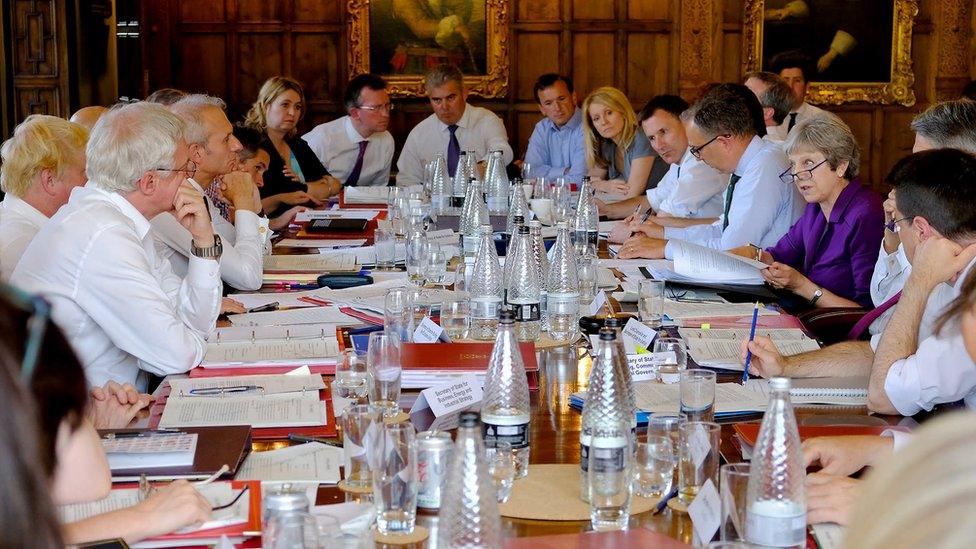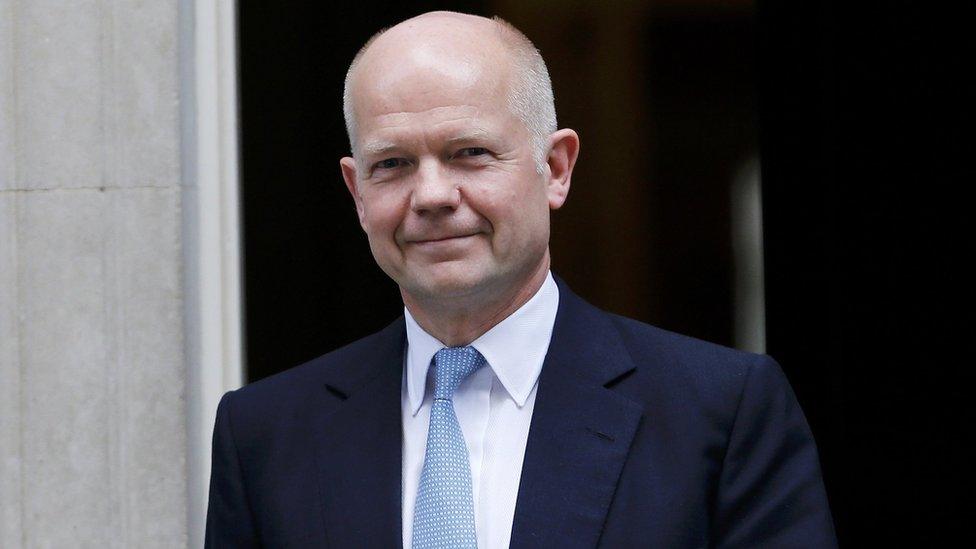Brexit: Are Tory grassroots members 'taking back control'?
- Published

The plans agreed at Chequers last month have upset some Conservative members
Theresa May is not only under pressure from her MPs on Brexit - there has also been talk of a "revolt" among grassroots members unhappy at her plans.
In recent days there have even been suggestions of "infiltration" into the party by UKIP supporters wanting to influence a future leadership contest.
There have also been calls for a rule change that might make it easier for MPs popular with the grassroots to become leader.
Lord Hague does not want the party to go down this path - the former party leader has warned about the membership being "swamped by a sudden influx of new recruits".
So are the Tory grassroots, to coin a phrase, "taking back control"?
In 2016, between David Cameron resigning as prime minister and Theresa May presiding over her first Conservative Party conference as leader that autumn, Conservative Party membership surged by as much as 50,000.
Some put this down to excitement at the new direction the country was taking. Now, however, some suspect it may have been the beginnings of a harder right seeking to influence party policy - particularly UKIP supporters masquerading as Tories in order to pressurise their local MP into maintaining a 'hard Brexit' policy.
Supporting this theory are the many former UKIP voters who defected to the Conservatives in the 2017 election.
More recently, former UKIP donor and Nigel Farage ally Arron Banks called for supporters of his Leave.EU group to join the Conservative Party so they can vote in the party's next leadership election.
There have been tweets from people supporting his campaign and displaying their new membership cards:
Allow X content?
This article contains content provided by X. We ask for your permission before anything is loaded, as they may be using cookies and other technologies. You may want to read X’s cookie policy, external and privacy policy, external before accepting. To view this content choose ‘accept and continue’.
Allow X content?
This article contains content provided by X. We ask for your permission before anything is loaded, as they may be using cookies and other technologies. You may want to read X’s cookie policy, external and privacy policy, external before accepting. To view this content choose ‘accept and continue’.
Didier Delmer, who runs a Twitter account called #StandUp4Brexit, told the BBC he had been a Conservative member for 10 years until the Chequers plan was announced - at which point he joined UKIP.
He said that following Mr Banks's appeal he was "back with the Tory Party" and he recently tweeted a photograph of his new membership card.
"If Brexit doesn't go through, I'll feel like we have no democratic voice," he said.
"Put Boris Johnson in charge."
It has not gone down well with MPs from the party's pro-EU wing.
Anna Soubry, Conservative MP for Broxtowe and outspoken Remainer, has blasted the call as a "Blatant infiltration…to elect a UKIP-backed leader."
Allow X content?
This article contains content provided by X. We ask for your permission before anything is loaded, as they may be using cookies and other technologies. You may want to read X’s cookie policy, external and privacy policy, external before accepting. To view this content choose ‘accept and continue’.
But is the infiltration a reality or just being talked up by those who are involved in the debate?
Tracking membership of the Conservative Party is notoriously difficult, therefore to say there has been a definite and significant upsurge in membership would be impossible until the party releases new figures, which rumours suggest will happen before this year's party conference.
According to one local association staffer in the East Midlands: "We've been told to expect a surge…but not much as of yet."
Writing on grassroots website Conservative Home,, external its editor Paul Goodman says he has found no evidence so far of mass applications to join the party.
However many people join the Tories, there are defined rules for choosing the leader and, under these, MPs select the final two candidates who are then put to members for a vote.
This means there is no guarantee that someone popular with the grassroots - like Mr Johnson or Jacob Rees-Mogg - will make the final shortlist.
One activist and blogger, John Strafford, thinks this should change.
He's written to the party's board urging a change to the rule book so that any MP who commands support of 20 colleagues can be admitted to the final ballot of leadership contenders put forward to members.
'Dissatisfaction'
But, writing in Tuesday's Daily Telegraph,, external Lord Hague - under whose leadership the current rules were adopted - warns against such a move, comparing it with Labour's rule change which led to a surge in support for Jeremy Corbyn in the party's 2015 leadership contest.
He says the change being called for would put too much power in the hands of Tory activists, who he says "are often the first to point out that they are not remotely representative of society at large or even of their voters".
Ed Costello, chairman of independent activist group Grassroots Conservatives, believes there has certainly been a shift in how the party's supporters are yielding what power they have.
"What's changed is that the party are making their opinions more widely known because of dissatisfaction," he says, adding that constituency chairmen are no longer "maintainers of unity".
"Once upon a time [the grassroots] were loyal. But MPs have really annoyed, upset and disgusted local Conservatives across the country."
The Conservative grassroots have taken matters of major disagreement with the leadership on policy into their own hands before. Until changes brought in by Lord Hague in the late 1990s, party conferences used to involve local activists and members debating party policy, with a government minister "responding" to the debate at its conclusion.
In 1950, through such a mechanism, grassroots members reacted in "uproar" when a minister refused to back their calls for a 300,000 target for new homes. The figure was soon endorsed by the party and indeed became one of the most well-known and popular Conservative policies.
One grassroots attendee proudly remarked how they had succeeded in "educating the platform".
The Conservative Party conference is not a policy-making forum, but this incident certainly seemed influential in shaping policy.

William Hague has warned the Tories against changing their rules for electing leaders
Jack Aaron, a local Conservative activist from Hendon, claims that after the party leadership failed to consult local activists and members over the 2017 manifesto, the subsequent election result had emboldened and given grassroots "the means to hold the government to ransom".
With the various new hotbeds of grassroots activity - particularly "hard Brexit"-supporting groups preparing to return to the campaign trail after a quiet couple of years - another attempt to "educate the platform" could be on the horizon.
Among widespread discontent with Theresa May's policy on Brexit, Conservative grassroots voices - alongside those of local association chairs and members - are arguably wielding more influence than ever over party policy, particularly as Brexit continues to dominate the political agenda.
Now, there is talk of another surge of grassroots applications to attend this year's conference, echoing 2016, as well as allowing them a bigger say over the event's official proceedings.
It is the Conservative grassroots and local members who are the foot soldiers of the party charged with selling the government's policies to the electorate.
How they choose to present and mould policy on the doorstep is crucial for galvanising support - and Theresa May knows it.
This is why local members of the party have seen both their inboxes and letterboxes swell in recent months with appeals from head office - and from the prime minister herself - to support party policy as the Brexit deadline draws nearer.
Mass emails have been sent to members in the wake of Chequers, and local association chairmen and officers have had front-and-centre access to figures at the top of the party, attending briefings in No 10 and participating in conference calls.
Mrs May is also planning to spend what remains of her summer on a so-called "charm offensive", visiting local association chairmen to persuade them to act as ambassadors for the government's Brexit policy in what will add to her attempts to quell a sizzling summer of discontent amongst the grassroots. This is all quite unprecedented.
Steven Fielding, professor of politics at Nottingham University, says this appeal to activists is more a reflection of the prime minister's perilous position than increasingly strong grassroots.
But the discontent outside Westminster is clearly on show.